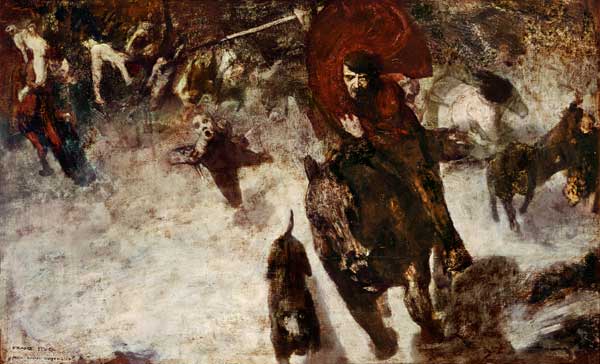It is above all the Germans who have an opportunity, perhaps unique in history, to look into their own hearts and to learn what those perils of the soul were from which Christianity tried to rescue mankind. Germany is a land of spiritual catastrophes, where nature never makes more than a pretence of peace with the world-ruling reason. The disturber of the peace is a wind that blows into Europe from Asia’s vastness, sweeping in on a wide front from Thrace to the Baltic, scattering the nations before it like dry leaves, or inspiring thoughts that shake the world to its foundations. It is an elemental Dionysus breaking into the Apollonian order. The rouser of this tempest is named Wotan, and we can learn a good deal about him from the political confusion and spiritual upheaval he has caused throughout history. For a more exact investigation of his character, however, we must go back to the age of myths, which did not explain everything in terms of man and his limited capacities, but sought the deeper cause in the psyche and its autonomous powers. Man’s earliest intuitions personified these powers. Man’s earliest intuitions personified these powers as gods, and described them in the myths with great care and circumstantiality according to their various characters. This could be done the more readily on account of the firmly established primordial types or images which are innate in the unconscious of many races and exercise a direct influence upon them. Because the behaviour of a race takes on its specific character from its underlying images, we can speak of an archetype “Wotan.” As an autonomous psychic factor, Wotan produces effects in the collective life of a people and thereby reveals his own nature. For Wotan has a peculiar biology of his own, quite apart from the nature of man. It is only from time to time that individuals fall under the irresistible influence of this unconscious factor. When it is quiescent, one is no more aware of the archetype Wotan than of a latent epilepsy. Could the Germans who were adults in 1914 have foreseen what they would be today? Such amazing transformations are the effect of the god of wind, that “bloweth where it listeth, and thou hearest the sound thereof, but canst not tell whence it cometh, nor whither it goeth.” It seizes everything in its path and overthrows everything that is not firmly rooted. When the wind blows it shakes everything that is insecure, whether without or within.
...
It was not in Wotan’s nature to linger on and show signs of old age. He simply disappeared when the times turned against him, and remained invisible for more than a thousand years, working anonymously and indirectly. Archetypes are like riverbeds which dry up when the water deserts them, but which it can find again at any time. An archetype is like an old watercourse along which the water of life has flowed for centuries, digging a deep channel for itself. The longer it has flowed in this channel the more likely it is that sooner or later the water will return to its old bed. The life of the individual as a member of society and particularly as a part of the State maybe regulated like a canal, but the life of nations is a great rushing river which is utterly beyond human control, in the hands of One who has always been stronger than men.















 Reply With Quote
Reply With Quote










